Fleurs du Mal Magazine



De Kunduz coalitie: D66 – Groenlinks – CDA – Christenunie en VVD heeft besloten de BTW voor beeldende kunst verder te verhogen van 6 via 19 naar 21 procent per 1 october.
Beste Kunstenaar, galeriehouder en kunstliefhebber,
Zoals U wellicht heeft vernomen gaat de btw voor de podiumkunsten weer verlaagd worden naar 6%. Die van de beeldende kunst daarentegen gaat per 1 oktober omhoog naar 21%. Een volstrekt oneerlijk en onbegrijpelijk onderscheid binnen de cultuursector wordt hierdoor aangebracht.
Teken onderstaande petitie, zodat we aan deze oneerlijke en voor de beeldende kunst ondermijnende situatie een eind kunnen maken!
Schuilen in het Rijks
≡ Teken de Petitie: btwopkunstnaar6.petities.nl
Aanbieding Petitie: September 2012
fleursdumal.nl magazine
More in: Melseke, Columns, The talk of the town
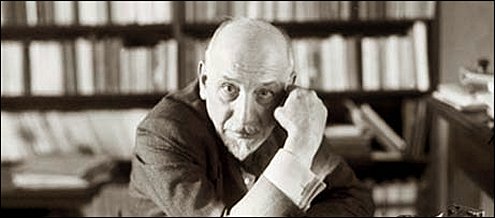
Luigi Pirandello: Shoot! (16)
Shoot! (Si Gira, 1926) The Notebooks of Serafino Gubbio, Cinematograph Operator by Luigi Pirandello. Translated from the Italian by C. K. Scott Moncrieff.
BOOK III
5
It is no mere waste of time, you will understand, to spend half an hour in watching and considering a tiger, seeing in it a manifestation of Earth, guileless, beyond good and evil, incomparably beautiful and innocent in its savage power. Before we can come down from this “aboriginality” and reach the stage of being able to see before us a man or woman of our own time, and to recognise and consider him or her as an inhabitant of the same earth, we require–I do, at least; I cannot answer for you–a wide stretch of imagination.
And so I remained for a while looking at Signora Nestoroff before I was able to understand what she was saying to me.
But the fault, as a matter of fact, was not only mine and the tiger’s. The fact of her addressing me at all was unusual; and it is quite natural, when anyone addresses us suddenly with whom we have not been on speaking terms, that we should find it hard at first to take in the meaning, sometimes even the sound of the most ordinary words, and should ask:
“Excuse me, what was it you said?”
In a little more than eight months, since I came here, between her and myself, apart from formal greetings, barely a score of words have passed.
Then she–yes, this happened too–coming up to me, began to speak to me with great volubility, as we do when we wish to distract the attention of some one who has caught us in some action or thought which we are anxious to keep secret. (The Nestoroff speaks our language with marvellous ease and with a perfect accent, as though she had lived for many years in Italy: but she at once breaks into French whenever, if only for a moment, she changes her tone or grows excited.) She wished to find out from me whether I believed that the actor’s profession was such that any animal whatsoever (not necessarily in a metaphorical sense) could regard itself as qualified, without preliminary training, to practise it.
“Where?” I asked her.
She did not understand my question.
“Well,” I explained to her; “if you mean, practise it here, where there is no need of speech, perhaps even an animal–why not!–may be capable of succeeding.”
I saw her face cloud over.
“That will be it,” she said mysteriously.
I seemed at first to divine that she (like all the professional actors who are employed here) speaking out of contempt for certain others who, without actually needing, but at the same time not despising an easy source of revenue, either from vanity or from predilection, or for some other reason, had managed to have their services accepted by the firm and to take their place among the actors, with no great difficulty, that supreme difficulty being eliminated which it would have been most arduous for them and perhaps impossible to overcome without a long training and a genuine aptitude, I mean the difficulty of speaking in public. We have a number of them at the Kosmograph who are real gentlemen, young fellows between twenty and thirty, either friends of some big shareholder on the Board, or shareholders themselves, who make a hobby of playing some part or other that has taken their fancy in a film, solely for their own amusement; and play their parts in the most gentlemanly fashion, some of them even with a grace that a real actor might envy.
But, reflecting afterwards on the mysterious tone in which she, her face suddenly clouding over, had uttered the words: “That will be it,” the suspicion occurred to me that perhaps she had heard the news that Aldo Nuti, I do not yet know from what part of the horizon, was trying to find an opening here.
This suspicion disturbed me not a little.
Why did she come to ask me, of all people, with Aldo Nuti in her mind, whether I believed that the actor’s profession was such that any animal might consider itself qualified, without preliminary training, to practise it? Did she then know of my friendship with Giorgio Mirelli?
I had not then, nor have I now any reason to think so. At least the questions with which I have adroitly plied her in the hope of enlightenment have brought me no certainty.
I do not know why, but I should dislike intensely her knowing that I was a friend of Giorgio Mirelli, in his boyhood, and a familiar inmate of the villa by Sorrento into which she brought confusion and death.
“I do not know why,” I have said: but it is not true; I do know why, and I have already given a hint of the reason. I feel no love, I repeat again, nor could I feel any, for this woman; hatred, if anything. Everyone hates her here; and that by itself would be an overwhelming reason for me not to hate her. Always, in judging other people, I have endeavoured to break the circle of my own affections, to gather from the clamour of life, composed more of tears than of laughter, as many notes as I could outside the chord of my own feelings. I knew Giorgio Mirelli; but how, in what capacity? Such as he was in his relations with me. He was the sort of person that I liked. But who, and what was he in his relations with this woman? The sort that she could like? I do not know. Certainly he was not, he could not be one and the same person to her and to myself. And how then am I to judge this woman by him? We have all of us a false conception of an individual whole. Every whole consists in the mutual relations of its constituent elements; which means that, by altering those relations however slightly, we are bound to alter the whole. This explains how some one who is reasonably loved by me can reasonably be hated by a third person. I who love and the other who hates are two: not only that, but the one whom I love, and the one whom the third person hates, are by no means identical; they are one and one: therefore they are two also. And we ourselves can never know what reality is accorded to us by other people; who we are to this person and to that.
Now, if the Nesteroff came to hear that I had been a great friend of Giorgio Mirelli, she would perhaps suspect me of a hatred for herself which I do not feel: and this suspicion would be enough to make her at once become another person to me, I myself remaining meanwhile in the same attitude towards her; she would assume in my eyes an aspect that would hide all the rest; and I should no longer be able to study her,as I am now studying her, as a whole.
I spoke to her of the tiger, of the feelings which its presence in this place and the fate in store for it aroused in me; but I at once became aware that she was not in a position to understand me, not perhaps because she was incapable of doing so, but because the relations that have grown up between her and the animal do not allow her to feel either pity for it or anger at the deed that is to be done.
Her answer was shrewd:
“A sham, yes; stupid too, if you like; but when the door of the cage is opened and the animal is driven into the other, bigger cage representing a glade in a forest, with the bars hidden by branches, the hunter, even if he is a sham like the forest, will still be entitled to defend himself against it, simply because it, as you say, is not a sham animal but a real one.”
“But that is just where the harm lies,” I exclaimed: “in using a real animal where everything else is a sham.”
“Where do you get that?” she promptly rejoined. “The part of the hunter will be a sham; but when he is face to face with this ‘real’ animal he will be a ‘real’ man! And I can assure you that if he does not kill it with his first shot, or does not wound it so as to bring it down, it will not stop to think that the hunter is a sham and the hunt a sham, but will spring upon him and ‘really’ tear a ‘real’ man to pieces.”
I smiled at the acuteness of her logic and said:
“But who will have wished such a thing. Look at her as she lies there. She knows nothing, the beautiful creature, she is not to blame for her ferocity.”
There was a strange look in her eyes, as though she suspected that I was trying to make fun of her; then she smiled as well, shrugged her shoulders slightly and went on:
“Do you feel is to deeply! Tame her! Make her a stage tiger, trained to sham death at a sham bullet from a sham hunter, and then all will be right.”
We should never have come to an under-standing; because if my sympathies were with the tiger, hers were with the hunter.
In fact, the hunter appointed to kill the animal is Carlo Ferro. The Nestoroff must be greatly upset by this; and perhaps she comes here not, as her enemies assert, to study her part, but to estimate the risk which her lover will be running.
He too, for all that he shews a scornful indifference, must, in his heart of hearts, feel apprehensive. I know that, in conversation with the General Manager, Commendator Borgalli, and also upstairs in the office, he has put forward a number of claims: the insurance of his life for at least one hundred thousand lire, to be paid to his parents in Sicily, in the event of his death, which heaven forbid; another insurance, for a more modest sum, in the event of his being incapacitated for work by any serious injury, which heaven forbid also; a handsome bonus, if everything, as is to be hoped, turns out well, and lastly–a curious claim, and one that was certainly not suggested, like the rest, by a lawyer–the skin of the dead tiger.
The tigerskin is presumably for the Nestoroff; for her little feet; a costly rug. Oh, she must certainly have warned her lover, with prayers and entreaties, against undertaking so dangerous a part; but then, seeing him determined and bound by contract, she must, she and no one else, have suggested to Ferro that he should claim ‘at least’ the skin of the tiger. “At least?” you say. Why, yes! That she used the words “at least” seems to me beyond question. ‘At least’, that is to say in compensation for the tense anxiety that she must feel for the risk to which he will be exposing himself. It is not possible that the idea can have originated with him, Carlo Ferro, of having the skin of the dead animal to spread under the little feet of his mistress. Carlo Ferro is incapable of such an idea. You have only to look at him to be convinced of it; look at that great black hairy arrogant goat’s head on his shoulders.
He appeared, the other day, and interrupted my conversation with the Nestoroff in front of the cage. He did not even trouble to inquire what we were discussing, as though a conversation with myself could not be of the slightest importance to him. He barely glanced at me, barely raised Ms bamboo cane to the brim of Ms hat in sign of greeting, looked with Ms usual contemptuous indifference at the tiger in the cage, saying to his mistress:
“Come along: Polacco is ready; he is waiting for us.”
And he turned his back, confident of being followed by the Nestoroff, as a tyrant by Ms slave.
No one feels or shews so much as he that instinctive antipathy, which as I have said is shared by almost all the actors for myself, and which is to be explained, or so at least I explain it, as an effect, which they themselves do not see clearly, of my profession.
Carlo Ferro feels it more strongly than any of them, because, among all his other advantages, he has that of seriously believing himself to be a great actor.
Luigi Pirandello: Shoot! (16)
kempis.nl poetry magazine

More in: -Shoot!
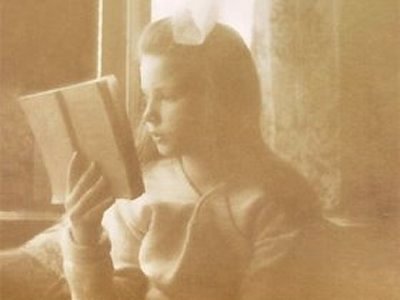
Sonja Prins
(1912-2009)
Geen stem
geen stem in de wolkbreuk de plotselinge waterval
van de daken glijdend
druipende steen met hun zoute tongen
verwoest o geen stem
onder het afdak
geen oog en geen beeld en geen godheid
buiten het raam
wuivende takken en de echo van een licht
over de grond kruipend
nee een stroom wild
rode robijn
een wilde stroom
en het daglicht dat opstijgt
in de kuil van de zee
die het land omvademt
geen stem maar hij komt
hij komt kruipend
(uit ‘Nieuwe proeve in strategie’ van Sonja Prins, 1912)
Sonja Prins poetry
kempis.nl poetry magazine
More in: Archive O-P
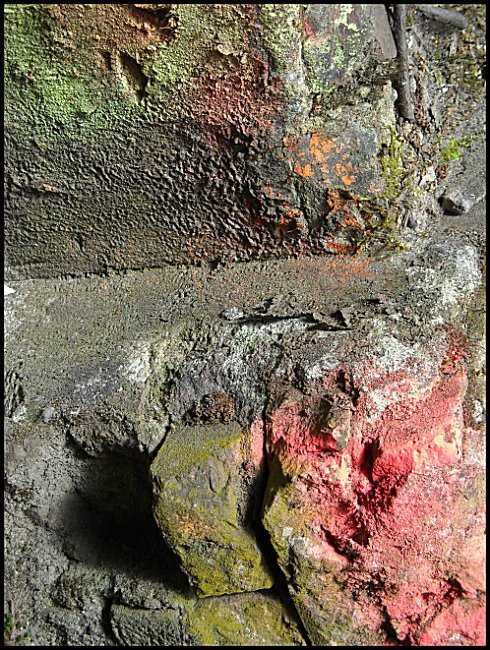
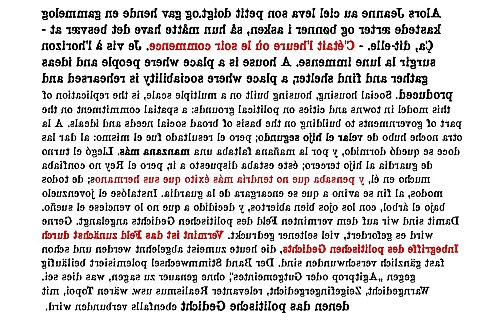
J.A. Woolf: Making memories (14)
kempis.nl poetry magazine 2012
More in: J.A. Woolf
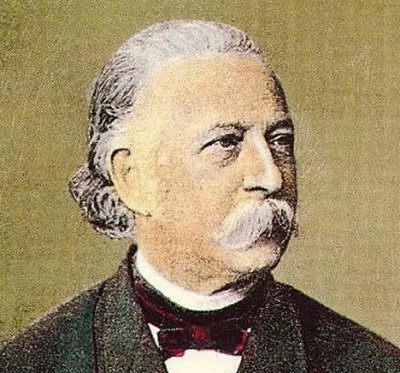
Theodor Fontane
(1819–1898)
Der echte Dichter
(Wie man sich früher ihn dachte)
Ein Dichter, ein echter, der Lyrik betreibt,
Mit einer Köchin ist er beweibt,
Seine Kinder sind schmuddlig und unerzogen,
Kommt der Mietszettelmann, so wird tüchtig gelogen,
Gelogen, gemogelt wird überhaupt viel,
»Fabulieren« ist ja Zweck und Ziel.
Und ist er gekämmt und gewaschen zuzeiten,
So schafft das nur Verlegenheiten,
Und ist er gar ohne Wechsel und Schulden
Und empfängt er pro Zeile ‘nen halben Gulden
Oder pendeln ihm Orden am Frack hin und her,
So ist er gar kein Dichter mehr,
Eines echten Dichters eigenste Welt
Ist der Himmel und – ein Zigeunerzelt.
Theodor Fontane poetry
kempis.nl poetry magazine
More in: Archive E-F, Theodor Fontane

Luigi Pirandello: Shoot! (15)
Shoot! (Si Gira, 1926. The Notebooks of Serafino Gubbio, Cinematograph Operator by Luigi Pirandello. Translated from the Italian by C. K. Scott Moncrieff.
BOOK III
4
Excuse me for a moment. I am going to pay a visit to the tiger. I shall talk, I shall go on talking, I shall pick up the thread of my discourse later on, never fear. At present, I must go and see the tiger.
Ever since they bought her, I have gone every day to pay her a visit, before starting my work. On two days only have I not been able to go, because they did not give me time.
We have had other animals here that were wild, although greatly subdued by melancholy: a couple of polar bears which used to spend the whole day standing on their hind legs beating their breasts, like Trinitarians doing penance: three shivering lion cubs, always huddled in a corner of the cage, one on top of another; other animals as well, that were not exactly wild: a poor ostrich, terrified at every sound, like a chicken, and always uncertain where to set its feet: a number of mischievous monkeys. The Kosmograph is provided with everything, including a menagerie, albeit its inmates remain there but a short time.
No animal has ever ‘talked to me’, like this tiger.
When we first secured her, she had but recently arrived, a gift from some illustrious foreign personage, at the Zoological Gardens in Rome. At the Zoological Gardens they were unable to keep her, because she was absolutely incapable of learning, I do not say to blow her nose with a handkerchief, but even to respect the most elementary rules of social intercourse. Three or four times she threatened to jump the ditch, or rather attempted to jump it, to hurl herself upon the visitors to the gardens who stood quietly gazing at her from a distance.
But what other thought could arise more spontaneously in the mind of a tiger (if you object to the word ‘mind’, let us say the paws) than that the ditch in question was put there on purpose so that she might try to jump it, and that those ladies and gentlemen stopped there in front of her in order that she might devour them if she succeeded in jumping it?
It is certainly an advantage to be able to stand a joke; but we know that not everyone possesses this advantage. Many people cannot even endure the thought that some one else thinks he is at liberty to joke at their expense. I speak of men, who, nevertheless, in the abstract, are all capable of realising that at times a joke is permissible.
The tiger, you say, is not placed on show in a zoological garden for a joke. I agree. But does it not seem a joke to you to think that she can suppose that you keep her there on show to give the public a “living idea” of natural history!
Here we are back at our starting-point. This, inasmuch as we are not tigers, but men, is rhetoric.
We may feel compassion for a man who is unable to stand a joke; we ought not to feel any for a beast; especially if the joke for which we have placed it on show, I mean the “living idea,” may have fatal consequences: that is to say, for the visitors to the Zoological Gardens, a too practical illustration of its ferocity.
This tiger was, therefore, wisely condemned to death. The Kosmograph Company managed to hear of it in time, and bought her. Now she is here, in a cage in our menagerie. Since she has been here, her behaviour has been exemplary. How are we to explain this? Our treatment, no doubt, seems to her far more logical. Here she is not at liberty to attempt to jump any ditch, has no illusion of ‘local colour’, as in the Zoological Gardens. Here she has in front of her the bars of her cage, which say to her continually: “You cannot escape; you are a prisoner”; and she lies on the ground there almost all day long, resigned to her fate, gazing out through the bars, quietly, wonderingly waiting.
Alas, poor beast, she does not know that here there is something far more serious in store for her, than that joke of the “living idea”!
The scenario is already completed, an Indian subject, in which she is destined to represent one of the principal parts. A spectacular scenario, upon which several hundred thousand lire will be spent; but the stupidest and most vulgar that could be imagined. I need only give the title: ‘The Lady and the Tiger’. The usual lady, more tigerish than the tiger. I seem to have heard that she is to be an English ‘Miss’ travelling in the Indies with a train of admirers.
India will be a sham, the jungle will be a sham, the travels will be a sham, with a sham ‘Miss’ and sham admirers: only the death of this poor beast will not be a sham. Do you follow me? And does it not make you writhe in anger?
To kill her in self-defence, or to save the life of another person, well and good. Albeit not of her own accord, for her own pleasure, has the beast come here to place herself on show among a lot of men, but men themselves, for their pleasure, have gone out to hunt her, to drag her from her savage lair. But to kill her like this, in a sham forest, in a sham hunt, for a stupid make-believe, is a real iniquity and is going too far. One of the admirers, at a certain stage, will fire point-blank at a rival. You will see this rival fall to the ground, dead. Yes, my friends. But when the scene is finished, there he is getting up again, brushing the dust of the stage off his clothes. But this poor beast will never get up again, after they have shot her. The scene shifters will carry off the sham forest, and at the same time clear the stage of her carcase. In the midst of a universal sham, her death alone will be genuine.
And if it were only a sham that could by its beauty and nobility compensate in a measure for the sacrifice of this beast. But no. It is utterly stupid. The actor who is to kill her will not even know, perhaps, why he has killed her. The scene will last for a minute or two at most, when projected upon the screen, and will pass without leaving any permanent impression in the minds of the spectators, who will come away from the theatre yawning:
“Oh Lord, what rubbish!”
This, you beautiful wild creature, is what awaits you. You do not know it, and gaze through the bars of your cage with those terror-stricken eyes in which the slit pupils contract and dilate by turns. I see your wild nature as it were steaming from your whole body, like the vapour of a blazing coal; I see marked on the black stripes of your coat the elastic force of your irrepressible spring. Whoever studies you closely is glad of the cage that imprisons you and checks in him also the savage instinct which the sight of you stirs irresistibly in his blood.
You cannot remain here on any other terms. Either you must be imprisoned like this, or you must be killed; because your ferocity–we quite understand–is innocent; nature has implanted it in you, and you, in employing it, are obeying nature and cannot feel any remorse. We cannot endure that you, after a gory feast, should be able to sleep calmly. Your very innocence makes us innocent of your death, when we inflict it in self-defence. We can kill you, and then, like you, sleep calmly. But out there, in the savage lands, where you do not allow any stranger to pass; not here, not here, where you have not come of your own accord, for your own pleasure. The beautiful, ingenuous innocence of your ferocity makes the iniquity of ours seem disgusting here. We seek to defend ourselves against you, after bringing you here, for our pleasure, and we keep you in prison: this is no longer your kind of ferocity; it is a treacherous ferocity! But we know, you may be sure, we know how to go even farther, to do better still: we shall kill you for amusement, stupidly. A sham hunter, in a sham forest, among sham trees…. We shall be worthy in every respect, truly, of the concocted plot. Tigers, more tigerish than a tiger. And to think that the sentiment which this film, now in preparation, is intended to arouse in the spectators is contempt for human ferocity! It will be part of o’ur day’s work, this ferocity practised for amusement, and we count moreover upon making a handsome profit out of it, should the film prove successful.
You stare. At what do you stare, you beautiful, innocent creature! That is just how things stand. You are here for no other purpose. And I who love and admire you, when they kill you, shall be ‘impassively’ turning the handle of this pretty machine here, do you see? They have invented it. It has to act; it has to eat. It eats everything, whatever stupidity they may set before it. It will eat you too; it eats everything, I tell you! And I am its servant. I shall come and plant it closer to you, when you, mortally wounded, are writhing in your last agony. Ah, do not fear, it will extract the utmost penny of profit from your death! It does not have the luck to taste such a dinner every day. You can have that consolation. And, if you like, another as well.
There comes every day, like myself, in front of your cage here, a lady intent on studying how you move, how you turn your head, how you look out of your eyes. The Nestoroff. Is that nothing to you? She has chosen you to be her teacher. Luck such as this does not come the way of every tiger.
As usual, she is taking her part seriously. But I have heard it said that the part of the ‘Miss’, “more tigerish than the tiger,” will not be assigned to her. Perhaps she does not yet know this; she thinks that the part is hers; and she comes here to study.
People have told me this, and laughed at it. But I myself, the other day, took her by surprise, on one of her visits here, and remained talking to her for some time. (to be continued)
Luigi Pirandello: Shoot! (15)
kempis.nl poetry magazine

More in: -Shoot!

William Shakespeare
(1564-1616)
THE SONNETS
128
How oft when thou, my music, music play’st,
Upon that blessed wood whose motion sounds
With thy sweet fingers when thou gently sway’st
The wiry concord that mine ear confounds,
Do I envy those jacks that nimble leap,
To kiss the tender inward of thy hand,
Whilst my poor lips which should that harvest reap,
At the wood’s boldness by thee blushing stand.
To be so tickled they would change their state
And situation with those dancing chips,
O’er whom thy fingers walk with gentle gait,
Making dead wood more blest than living lips,
Since saucy jacks so happy are in this,
Give them thy fingers, me thy lips to kiss.
![]()
kempis.nl poetry magazine
More in: -Shakespeare Sonnets

Iers gedicht ‘Ní fetar’
vertaald door Lauran Toorians
Ní fetar
cía lassa fífea Etan;
acht ro-fetar Etan bán
nícon ífea a hóenurán.
Ik weet niet
wie met Etan zal slapen,
maar ik weet dat de blonde Etan
niet alleen slapen zal.
Middeleeuwse Ierse gedichten vertaald door Lauran Toorians
kempis.nl poetry magazine
More in: CELTIC LITERATURE, Lauran Toorians

Inzendingen VSB POËZIEPRIJS 2013
In 2013 reikt de Stichting VSB Poëzieprijs in samenwerking met VSBfonds en Poetry International voor de 19e keer de VSB Poëzieprijs uit.
De VSB Poëzieprijs 2013 is bestemd voor een bundel Nederlandstalige poëzie, voor het eerst in boekvorm gepubliceerd in de periode 1 september 2011 – 31 augustus 2012. Vertaalde poëzie, bloemlezingen en verzamelbundels van één of meer auteurs die in voornoemde periode zijn verschenen, dingen niet mee. Zie ook het juryreglement.
Inzendingen zijn van harte welkom en dienen in zevenvoud opgestuurd te worden naar:
Stichting VSB Poëzieprijs
T.a.v. het bestuur
Postbus 10819
1001 EV Amsterdam
De inzendtermijn sluit op 31 augustus 2012. Nagezonden bundels worden niet meer meegenomen in de beoordeling.
De jury voor de VSB Poëzieprijs 2013 wordt bekend gemaakt tijdens het 43e Poetry International Festival (12-17 juni 2013).
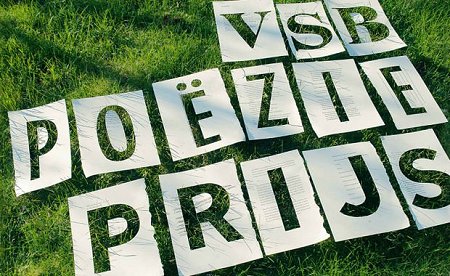
VSB poëzieprijs 2013
fleursdumal.nl magazine
More in: The talk of the town

Musici en dichters aan huis in Maastricht
zondag 13 mei 2012 – aanvang 12:30
Muziek en poëzie
Op zondagmiddag 13 mei verzorgen zeven musici (waaronder een duo) van het Conservatorium Maastricht én zes dichters een intieme voordracht met muziek en poëzie in zes Maastrichtse huiskamers in de nabije omgeving van Conservatorium Maastricht.
Benno Barnard, Frans Budé, Emma Crebolder, Quirien van Haelen, Paul Hermans en Hagar Peeters komen uit alle windstreken om zondagmiddag 13 mei voor te dragen uit eigen werk. Iedere dichter zorgt met samen met een student of alumnus van het Conservatorium Maastricht voor een muzikale poëtische voorstelling in intieme setting.
Het openingsconcert vindt plaats om 12.30 uur in de Willem Hijstekzaal van het Conservatorium. Masterstudent Jesse Passenier combineert samen met zijn Broad Music Orchestra op een prachtige manier poëzie, klassieke muziek en jazz/pop muziek in hun voorstelling ‘Nos Pères’. Het orkest bestaat veelal uit alumni en studenten van het Conservatorium.
Na de opening in het Conservatorium, beginnen de voordrachten om 14.00 uur en 15.30 uur in zes Maastrichtse huiskamers nabij het Conservatorium. U kiest twee van de zes voorstellingen uit en stelt daarmee uw eigen route samen. Tijdens elke voordracht luistert u ongeveer 15 minuten naar muziek en 15 minuten naar poëzie. Daarna is er nog gelegenheid tot een kort gesprek met de dichter en de musicus, waarna u een andere locatie kunt bezoeken.
Toegang en reserveren: Kaarten (die tevens het programma en een plattegrond bevatten) zijn op de dag zelf te koop aan de balie van Conservatorium Maastricht, Bonnefantenstraat 15, Maastricht. Ook kunt u vooraf per e-mail reserveren: reservering.conservatorium@zuyd.nl. Een passe-partout kost €15; voor studenten op vertoon van studentenkaart €5. Het passe-partout geeft toegang tot het openingsconcert én twee optredens van een dichter/ musicus op locatie. Een los ticket voor het openingsconcert kost €7,50.
Dichter Leo Herberghs schreef speciaal voor het jubilerend Conservatorium Maastricht een gedicht. Het is tot eind 2012 te bewonderen: het prijkt levensgroot op de zijgevel van het hoofdgebouw aan de Bonnefantenstraat 15. Ook vanaf het Academieplein is het goed zichtbaar.
Musici en dichters aan huis in Maastricht zondag 13 mei 2012
fleursdumal.nl magazine
More in: Art & Literature News, Literary Events, Peeters, Hagar, The talk of the town

Lauran Toorians over
Keltische poëzie in MAN IN DE MAAN in Eindhoven
Op zondagmiddag 13 mei 2012 komen de Kelten met hun poëzie naar Man in de Maan te Eindhoven. Aan de hand van Lauran Toorians, dé kenner op dit terrein in Nederland, zullen zij worden binnengeleid, uitgelegd en voorgedragen.
Na de pauze staat de poëzie van Seamus Heaney (*1939, Nrd-Ierland, Nobelprijs voor de literatuur 1995) centraal in voordrachten, door de dichter zelf (op film) en vertalingen door anderen (live).
Aanvang: 14 u. Bij Pennings Inside, Geldropseweg 63. Entree € 7,50
Reserveren: manindemaan@dse.nl en 040-2024987
fleursdumal.nl magazine
More in: CELTIC LITERATURE, Lauran Toorians

Nick J. Swarth
Mijn onsterfelijke lever (een winterverhaal)
1. Het is geen broodje aap, boef.
Het is een straat die op de kaart staat, gewoon,
die je nooit neemt
(omdat je het niet waard bent
genomen te worden > BLING = KING
& YOU’RE A QUEEN!
Kom, til gerust de deken op, ik heb niets op mijn
onsterfelijke lever. De lucht is bruin, het denken
dief. Schrompel, Schram & Schrot.
Krostovič, heb je hier telefoon?
Nee, maar d’r is een cel om de hoek.
Ik ga even bellen. Als ie grappen uithaalt, schieten.
O.K. Nick.
You must be 18+ to read this poem.
If you are not 18+ please close your eyes.
2. Koppen freest de kou,
een heer van sneeuw, sneeuwsoldaatjes, verstoken
van buit.
Schrompel, Schram & Schrot, Ave, Ade (van
de opmerkelijkste mummies zijn er enkele bij toeval
toeval geconserveerd
Niemand bewaakte de maag
Niemand hield de darmen vast
Niemand hield een oogje op de longen
Niemand woog het hart, de onsterfelijke lever
Geen barst, geen biet, geen zier
snars noch sikkepit, moer noch fluit.
Verse maden
haalt de visser
uit de muur 24/7 om de hoek bij de dierenspeciaalzaak
O GEKKIE
JE BEKKIE
EEN STEKKIE VAN STEEN!
3. Zum Korken, overgeleverd aan koffie & brein. Helen
clandestien. Op het scherm een gier, geluidloos een buik
vlies doordringend.
O, die, ja, die. Die, die lag een dag voor pampus,
kop in de kattenbak, benen wijd
(op z’n Mexicaans, meneer, uit de hand, meneer
knalden de knapen een kapitaal aan pijlen de lucht in &
bestookten elkaar met rotjes, daarna), ‘s anderendaags
het beesten
een kreng
dat nekloos ploegde door de vorstkorst
& in de Obstquelle
kleumend foerageerde
tussen voor het doordraaien
behoed fruit DRIE mango’s voor EEN enkele euro!
Productinformatie uit den boze
in het buisverlichte kot. Alle appels heten er ‘appel’
alle peren ‘peer’
alle aardappelen ‘aardappel’
en als ze pijn zouden verkopen heette het simpelweg
‘pijn’, alle pijn, ook de lekkere. Met een beetje geluk
heb je er een koopje aan, in het andere geval keil je
de zak in de container
& ga je morgen weer. Schrompel, Schram & Schrot.
(uit: Nick J. Swarth: MIJN ONSTERFELIJKE LEVER. Gedichten & tekeningen. Uitgeverij IJzer, Utrecht | 2012. ISBN 978 90 8684 086 1 – NUR 305 – Paperback, 64 blz. Prijs: € 10)
Nick J. Swarth’s nieuwe bundel heet Mijn onsterflijke lever (Uitgeverij IJzer, mei 2012). Eerder verscheen in druk: ¡Mondo Manga’ (gedichten); Horror Vacui | een docudrama in 14 staties, verslag van een schandaalverwekkend kunstproject; Naked City Poems (stadsgedichten); Vier zure zultsculpturen (grafiekmap); De napalmsessies (bundel-dvd). Voorganger van het guerrilla rock trio Betonfraktion. Swarth is voorts actief in Zwarte Vleugels, dat voorstellingen maakt op basis van een rock-’n-roll-dramaturgie. Zie voor meer informatie: www.swarth.nl.
nick j. swarth poetry
fleursdumal.nl poetry magazine
More in: 4SEASONS#Winter, Archive S-T, Swarth, Nick J.
Thank you for reading Fleurs du Mal - magazine for art & literature